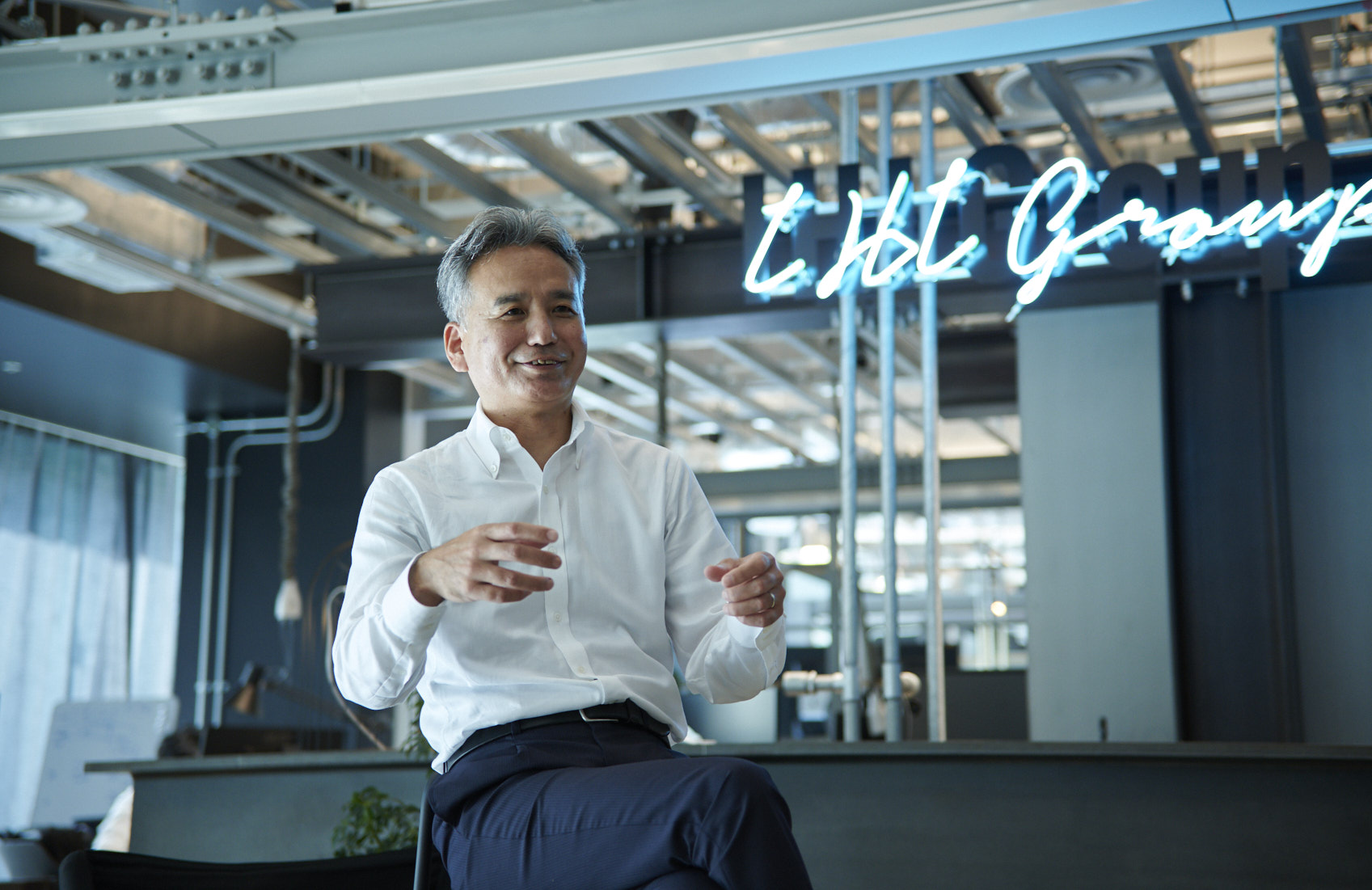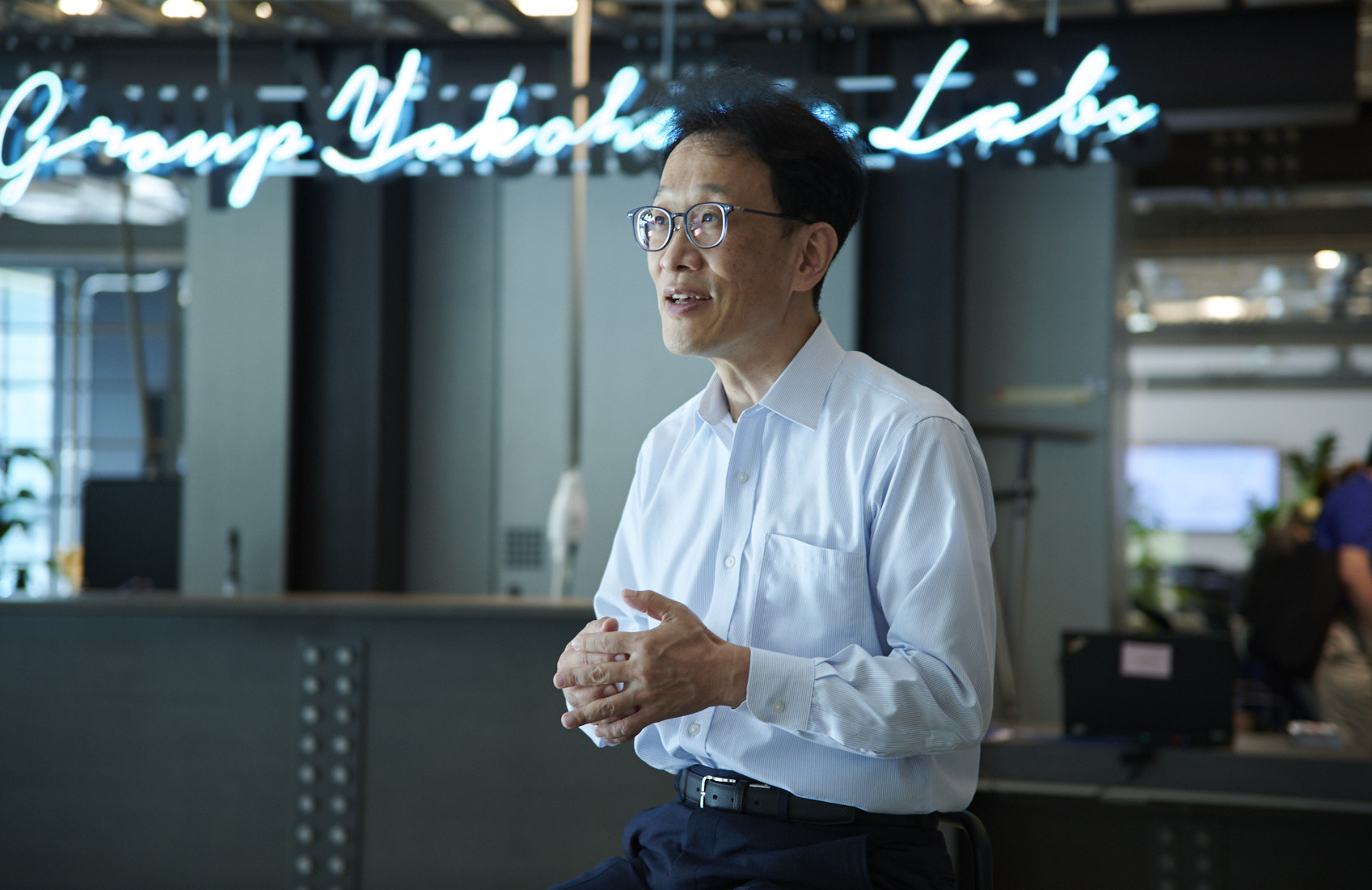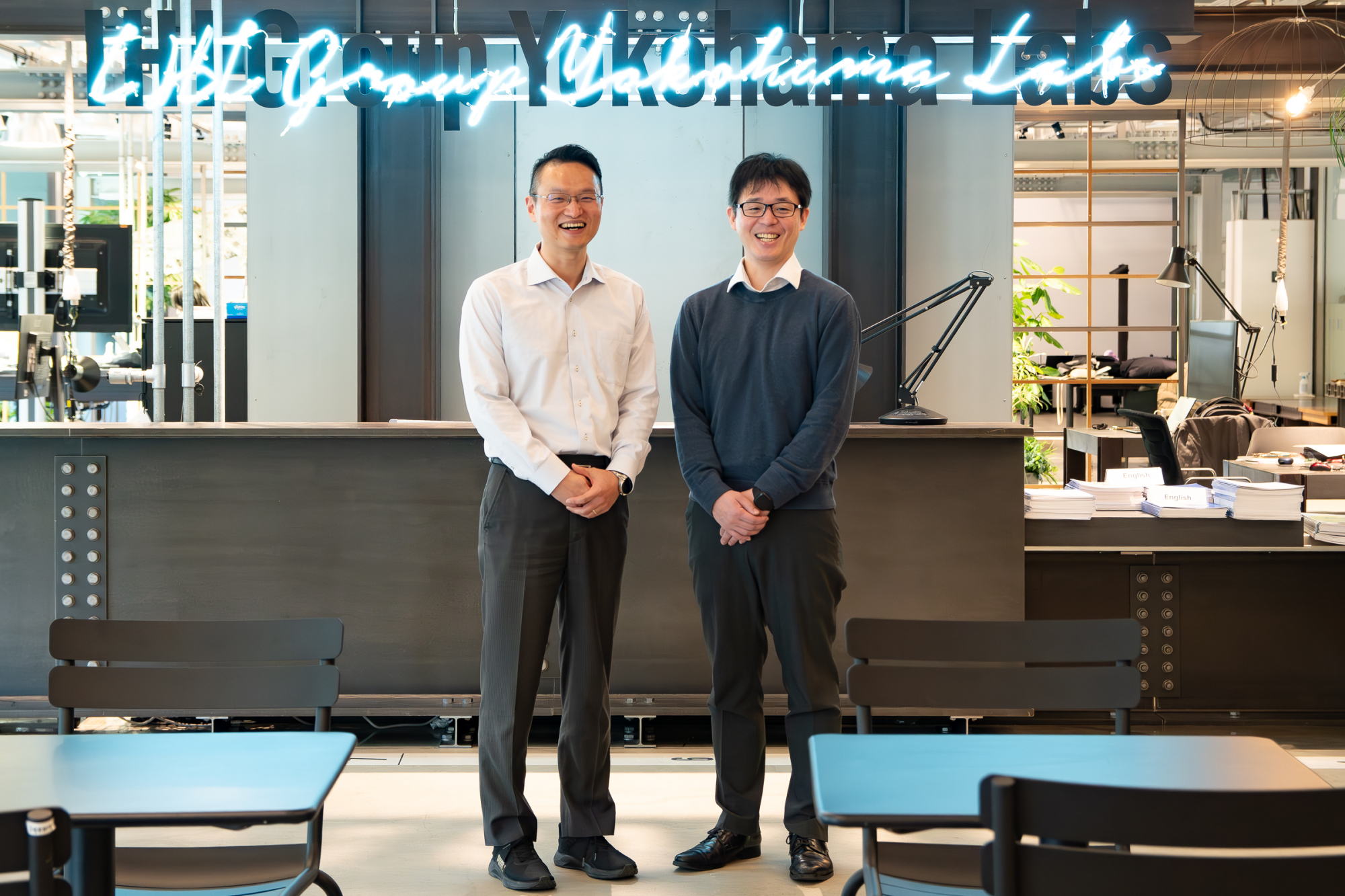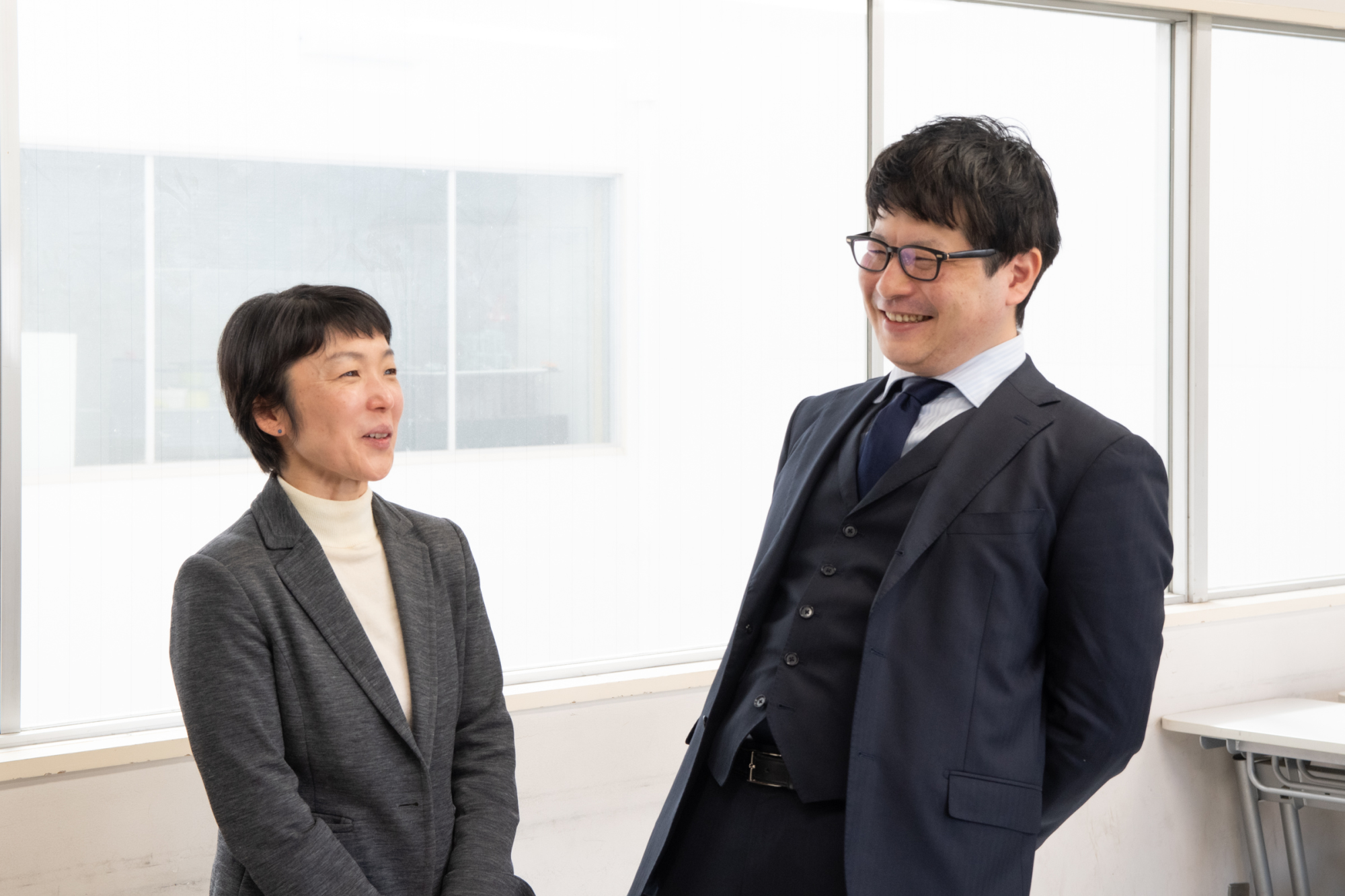Technology for establishing foundation of a future society for people’s happiness
Interview with Nobuhiko Kubota, General Manager of Technology & Intelligence Integration
What should a company do to bring about unprecedented innovation while addressing social issues? Kubota, General Manager of Technology & Intelligence Integration, says that there are two types of innovation for IHI to aim at. In this interview, he explains IHI’s system encouraging researchers to create new ideas and how IHI should be as a company that continuously contributes to society.
── As General Manager of Technology & Intelligence Integration, what do you think of an ideal form of innovation for IHI to achieve from now?
Kubota: There are two types of innovation for IHI to aim at. One is non-linear innovation. In contrast to non-linear innovation, the conventional style of technology development usually focuses on making improvement. Typical examples include weight reduction of materials and improvement in energy efficiency. Recent drastic changes in the world do not allow us to maintain this style. Taking some examples, fuels other than fossil fuels are in strong demand and vehicles without gasoline are increasing in number. As a result, it becomes necessary to create something completely different from before, that is non-linear innovation.
── What do you think engineers require in creating such kind of innovation?
Kubota: It is creativity. It may sound like self-praise, but there are full of attractive members in Technology & Intelligence Integration. However, many of them have been dedicated to the improvement of existing technology. There are plenty of competition in the field of such improvement activity, in other words, they have to fight a bloody contest. For this reason, I expect them to make a big jump by paying attention to information in the world with a wider view.
── Would you explain another type of innovation?
Kubota: Another is innovation for lowering a barrier, or for popularization. Some may think that innovation means amazing invention or discovery of a principle, but they are not all of the examples. Something thought to be common in the IHI Group can be new for external people, and vice versa. So, discussion with a lot of people inside and outside IHI will help create a new thing through combination of respective technologies and ideas. Something that has never existed before can be called innovation even if it does not seem a significant breakthrough.

── These two types of innovation should be different in quality, but how does Technology & Intelligence Integration proceed to achieve them?
Kubota: From fiscal year 2022, we will clearly separate our development projects into two categories: one is top-down projects and the other is self-motivated projects. As for the subjects essential for future growth of the IHI Group, we will set concrete goals to work on technology development. For the self-motivated projects, we will set a discretionary budget for each group of technological fields. The top management does not interfere how to spend the budget.
Unrestricted time and money are indispensable for getting a free idea regardless of fixed conception. Many employees are so diligent that they tend to disapprove of thinking something other than their assignments. This may be because of traditional education in Japan, but they should do what they want. To enhance the quality of research, spending time to think something completely unrelated to work or to think nothing is important. So, we will establish a system to authorize spending some working time freely.
── To achieve a non-linear innovation, what do you think is important in addition to the system?
Kubota: I think a company must tolerate failures in development activities. Most of significant research findings, including Nobel Prize-winning ones, resulted from a lot of failures. Among many development activities continued in spite of failures, just a few of them chanced to be successful and bear much fruit. Even if I say so, I know that it is difficult in reality for a company to allow failures of researchers for as long as decades. I hear many companies stop allocating budgets to the development projects unless their prospect for success is presented by their third year. Considering this situation, I think it is important to allow a project to go on even hiddenly from all other divisions if it is likely to be successful in the long term.
── On the other hand, how will the development through discussions be conducted?
Kubota: I hope that business-academia collaboration goes well by sharing roles to take advantage of respective strengths. One example is a collaboration between a university excellent in fundamental research and a company putting the research result into practical use. Such divisional cooperation systems are well established in US and UK, but in Japan, development is still strongly thought to be conducted by a company itself. Many Japanese companies are working on fundamental research like universities do, but this does not fit the times. So, what we should do is to determine on which technology to conduct research and development by ourselves and to conduct research and development on the other ones in collaboration with external organizations toward social issues solution. In my opinion, an excellent combination leads to innovation. Technology exchanges includes discussions, but it is difficult to create something new unless discussions go beyond technology exchanges.
── Which social issues do you plan to address?
Kubota: Our targets include carbon solution, disaster prevention and mitigation, and automation in response to issues of aging population. In addition, developing materials and manufacturing techniques is also necessary to achieve these targets. Since we are conducting development with focusing more clearly on socially necessary technologies than before, our contribution to society will be more visible.
── Speaking of contribution, to “Contribute to the development of society through technology” is a management philosophy of the IHI Group, isn’t it?
Kubota: I believe that IHI has provided products meeting social needs since the end of the Edo period, around middle 19th century. In the days immediately after the establishment in 1853, the then IHI was manufacturing ships. This is because Western vessels of the Perry Expedition brought about a great impact on Japan. In addition, shipbuilding had a role in national security. Since then, IHI has built many bridges to allow people to transfer easily. Confidently, IHI has made people’s lives affluent and convenient. This is not what anyone can do.
Ships and bridges had more importance when lives were less convenient, but they are still essential. Even in the current society, infrastructure development and security are required. Moreover, measures must be taken against environmental issues. CO2 emissions must be reduced, but energy supply must not be stopped. In the future, it will be necessary to think about outer space. From now on, IHI should continue to be capable of contributing to society. No matter how convenient society becomes, there is space for technology to make people happy.
Interview held at IHI Yokohama Works on November 16, 2021

Technology to increase options in the world
Interview with Toshiaki Nishio, Deputy General Manager of Technology & Intelligence Integration
As for corporate response to environmental issues, many people may think of CSR activities or other peripheral activities. However, the IHI Group regards these issues as clues for developing technology, which is the core of our business. Nishio, who had experienced the process from the launch of an intra-venture business to its scaling up, explains the technology development that Technology & Intelligence Integration aims at and the scheme from fiscal year 2022 onward.
── At first, could you explain your background, please?
Nishio: It has been around 30 years since I started working for the IHI Group. During my first 15 years, I belonged to sales division. Because I graduated from economics department, I do not specialize in technology but in business. After that, I was involved in several projects for launching new businesses, and in 2014 I was assigned to work for developing the energy storage business. I came to develop business in USA, but the members included only me and another at the beginning. Starting from renting an aged office like a warehouse, the members increased to around 60 and the order volume exceeded 10 billion yen in seven years, during which I had stayed in USA. I think this was like a so-called intra-venture business.
── Are you here to apply these experiences to activities of Technology & Intelligence Integration?
Nishio: Yes. But my experiences will not directly help because the role of Technology & Intelligence Integration is not to establish new businesses but to establish technologies for new businesses. What we will place importance on is to build an innovation process.
Researchers focus on their own fields of specialization, but this may be said that they tend to lock themselves inside the narrow fields. So, managers must think how each research result can be used or connected with the other technology and define the process. In other words, we help researchers to step back from their research. This also means setting a mission.
── What do you think is the innovation ideal for Technology & Intelligence Integration?
Nishio: The most clear, brilliant example may be blue LEDs. However, such a great invention cannot be made easily. I think a novel thing can be created through combination of technologies. In my opinion, combining two or more fundamental technologies, which are not close to commercial use, creates an innovation which can supplement absence. What is required to achieve this is the process. Of course, a spark of genius, which produced blue LEDs or other epoch-making inventions, does exist in the world, but a company cannot exclusively pursue such a spark of genius. Regarded not as a point but as an area, technology shows another aspects.
── Could you explain the process concretely?
Nishio: To explain it briefly, the planning department clarifies social issues through market and social conditions and collects the related data, and then the issues and data are shared with researchers to launch research projects toward respective goals. The key is setting goals clearly. Instead of aiming at quick-fix goals, we will develop technologies that meet social needs. The process for this is likened to establishing milestones and climbing stairs one by one.
It is an undisputable fact that this process alone cannot lead to very revolutionary technology. Based on this thought, we decided to clearly divide projects into two categories: development projects with concrete goals and research projects on which each group has discretion. Conventionally, it was difficult to launch a new research project because of our complicated approval process. To solve this problem, the complicatedness is completely removed, and the rule is set to allow each group to flexibly advance their research within budget. We defined research projects to be managed with goals and those to be conducted without restrictions except for budget. It is true that following a process is required to consistently accomplish certain results. However, it is not enough to achieve outstanding success.
── I know that the IHI Group currently aims for solving social issues through innovation. How does the aim relate to your business activity?
Nishio: Many people regard efforts against environmental problems or on ESG as unrequited service. This may be because these efforts are seen as an extension of CSR activities or corporate patronage of the arts and culture and corporate contribution to society is thought to be free of charge. However, it should not be so. Every company needs to advance while making a profit. Thinking of current situation, it is ideal to develop as many technologies for social issues as possible and to commercialize the technologies. I think social issues are likely to effect innovation because many of them are new to engineers. It is recent that CO2 emissions became controversial. Society changes rapidly, but what the IHI Group does will be the same as it has done for more than a hundred years in that it contributes to society through technology development.
── I understand that the IHI Group will improve the environment and daily life through technology.
Nishio: Many famous persons say that we have to give up pursuing the capitalism of mass consumption or convenience to solve environmental issues, but I personally doubt the idea. Of course, it should be avoided to throw away things wastefully. However, I believe that technology will definitely solve social issues and realize a convenient society at the same time. We do not intend to create a society where everyone lives a slow life. Our goal is to solve global warming and other social issues while making people’s lives comfortable. I think that human beings should not give up something but increase possible options in the world through technology.
Interview held at IHI Yokohama Works on November 16, 2021
Interviewed and edited in Japanese by Mai Tsunoo, a writer



